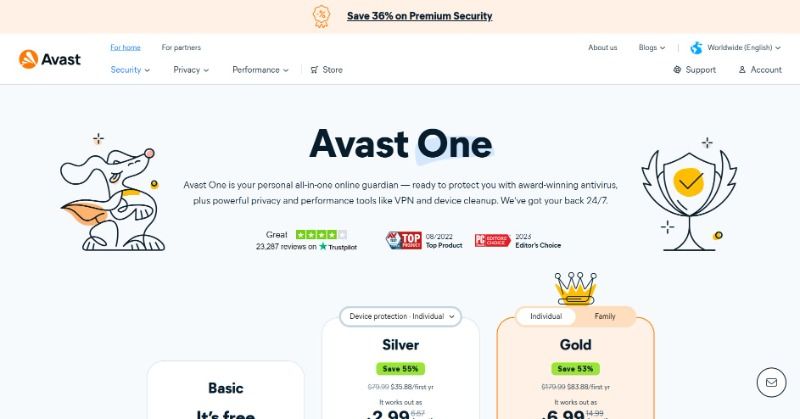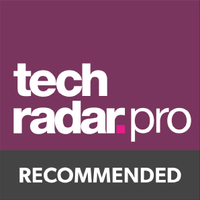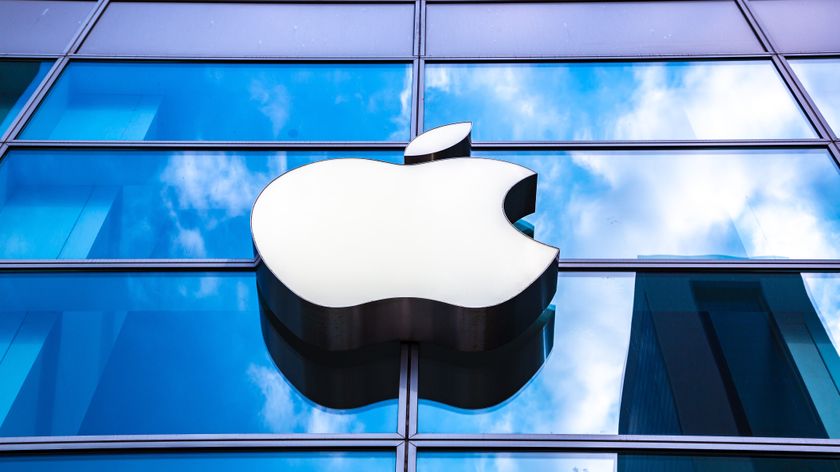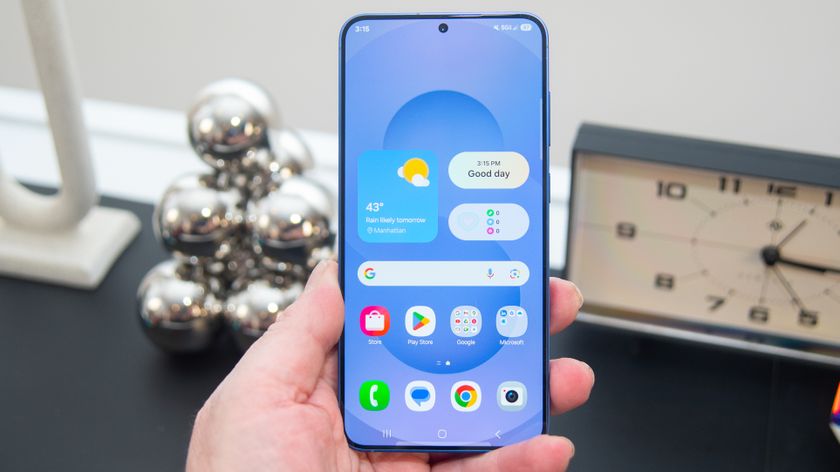TechRadar Verdict
Excellent all-round protection is provided by a range of powerful tools, even in the free version. Paid-for options offer more security, but general home users might find the free package suitable for the majority of their needs.
Pros
- +
Near-perfect malware protection
- +
No noticeable effect on device performance
- +
Limited free version available
- +
Very affordable
- +
60-day free trial of Gold tier
Cons
- -
No browser extensions
- -
Lacks a password manager
Why you can trust TechRadar
This is the all-in-one roundup reviewing every Avast One consumer security solution for 2025. On this page, after the intro, you’ll find
(a) a full evaluation of the free Avast One Basic, along with reviews of the additional features incorporated with the rest of the range:
(b) Avast One Silver,
(c) the top-end package Avast One Gold
You can jump to the reviews of those individual products by clicking on the links in the bar at the top of this page, but bear in mind that this article is really designed to be read all the way through, as the features of Avast One Basic are also present in the higher-level security suites, of course.
With Avast One, Avast has once again justified its reputation as one of the best antivirus software solutions out there, and third-party test labs support this with clear evidence. Among the main reasons to consider its consumer range is the sheer amount of advanced security tools on offer.
For example, every paid subscription comes with a full VPN and a helpful system cleanup tool. There’s also webcam monitoring in there for good measure, and all Avast One apps include anti-phishing, ransomware protection, password monitoring, and a simple yet effective firewall.
Despite limitations, the free antivirus tier called Avast One Basic provides a pretty good idea on what you can expect in the paid packages.
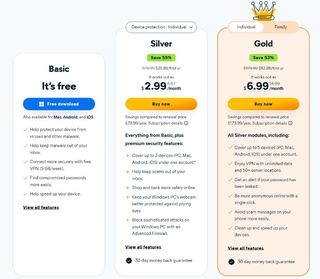
Plans and pricing
As mentioned above, Avast One Basic boasts a solid number of security tools for a free platform. They include malware monitoring, network scanning, a firewall, tracker blocking, system optimizations, and email protections.
Other, albeit limited, tools include a password protection tool that can look for compromised passwords, but you have to run it manually. The same goes for installing software updates.
Basic users can also use the secure VPN, but it’s limited to 5GB per week and a single server location. Still, this might be enough for more than a day or so of continuous music streaming or about 10 hours of watching video content.
There are two main tiers: Silver and Gold, which at their core offer a very similar service. However, their pricing is customizable in terms of the number of users covered.
Specifically, the Silver tier starts at $2.99 per month during the first year, after which the price increases to $6.67 a month (or $79.99 per year). The Gold tier starts at $6.99 per month for the first year, after which it renews at $179.99 per year. Each of the two tiers is available as an individual plan (up to 3 devices for Silver and 5 devices for Gold) or a family plan (up to 30 devices).
Silver provides everything from Basic, plus premium features that include shopping and banking safety, webcam protection, an advanced email guardian, sensitive information protections, expanded data breach monitoring, digital fingerprint masking, advanced password security, an unlimited VPN with 50+ locations, driver updater, and automatic app updater - just to name some of them.
The Gold tier essentially adds support for more users and has everything that’s included in Silver. The best part? There’s a 60-day free trial if you download the Basic app first. You just need to submit payment information and remember to cancel the subscription if you don’t wish to be charged.
Compare Avast One subscriptions
| Row 0 - Cell 0 | Avast One Basic | Avast One Silver Individual | Avast One Silver Family | Avast One Gold Individual | Avast One Gold Family |
| Operating system | Windows | Windows, Mac, Android, iOS | Windows, Mac, Android, iOS | Windows, Mac, Android, iOS | Windows, Mac, Android, iOS |
| Number of devices | 1 | 3 | 30 | 5 | 30 |
| Starting price | Free | $35.88 | $59.88 | $83.88 | $113.88 |
| VPN | 5GB/week, 1 location | Unlimited, 50 locations | Unlimited, 50 locations | Unlimited, 50 locations | Unlimited, 50+ locations |
| Password monitoring | Manual | Automatic | Automatic | Automatic | Automatic |
| Application updates | Manual | Automatic | Automatic | Automatic | Automatic |
| Scam/email protection | √ | √ | √ | √ | √ |
| Firewall | √ | √ | √ | √ | √ |
| Device speed up | √ | √ | √ | √ | √ |
| Identity protection | Row 10 - Cell 1 | Row 10 - Cell 2 | Row 10 - Cell 3 | √ | √ |
Avast One Basic
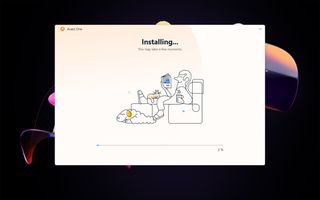
Avast One’s installer isn’t very customizable, so you won’t get to pick and choose the tools to download. At the same time, it makes the process rather straightforward. Once installed, it becomes clear that Avast One doesn’t slow down your system at all.
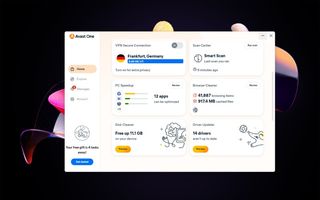
Interface
Avast One interface is sleek, with friendly graphics and easy access to all of the platform’s core features. They are available by scrolling down and there are shortcuts to scans, VPN, and other features.
The Explore button on the left reveals a full list of Avast One’s features. Some options aren’t available in the Avast One Basic, including webcam protection, web hijack guard, automatic driver updater, and the like.
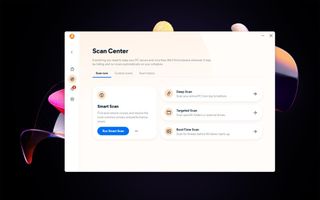
Antivirus
Avast One’s antivirus features start with the Smart Scan. You can launch this with a single click, and it will take up to 10 seconds to do a quick scan for malware and check for dubious browser add-ons and PC performance issues.
A Deep Scan checks your entire system; a Targeted Scan allows you to select specific files or folders to examine; while a Boot-Time Scan checks for threats before your system fully starts. And if that’s not enough, there’s an option to create custom scan types to do whatever you want.
The configuration settings let you define what to scan (all hard drives, the system drive alone, removable drives, archives, specific folders, and so on), how to treat any threats, set file type scan priority to optimize performance, and more.
Avast One’s scan speeds are solid, on par on industry’s average, taking about 10 minutes to scan our entire system.
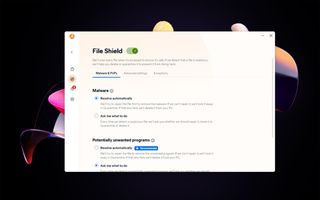
Protection
Indeed, the latest AV-Comparatives September 2024 summary report has placed Avast Basic close to the top antivirus products, with an impressive 95.8% online detection rate.
It dipped slightly in offline detection and wrongly tagged four files as malicious, but has nonetheless performed well against competition, earning it the ‘Advanced+’ award.
AV-Test’s Home Windows report from December 2024 placed Avast in its top antivirus group, rated in three different areas. The platform earned a perfect 6/6 score on all of them - protection, performance, and usability.
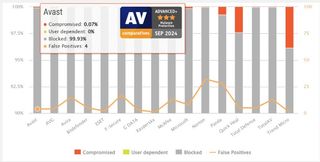
Ransomware Shield
After installation, Avast One automatically detects folders with user documents and then adds them to the company’s Ransomware Shield Protect list. Untrusted apps aren’t allowed to modify the contents of anything in these folders without permission.
Blocking malicious sites
Avast one also detects and blocks access to malicious websites with its Web Shield, reducing the chance you’ll get infected in the first place. There are no browser extensions, but it is possible to install Avast Online Security separately if you need it.
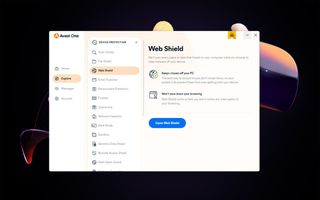
Network protection
Avast One Basic includes a simple firewall that monitors your traffic to stave off hackers and malware. It also lists apps using your connection, the amount of data they’ve transferred so far, and allows you to manually block them.
Upgrading to the paid Avast Silver tier apparently gets you more shielding of your system and detection, including hiding your info from other devices on the network, as well as adding user alerts for port scans and ARP spoofing (an exploit that potentially allows hackers to infiltrate your network).
The Network Inspector is there as another tier of protection, scanning all the devices found on your network, checking for any vulnerabilities, and listing all the networks your device has been connected to.
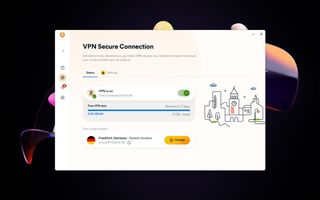
Avast VPN
Installing the free Avast One Basic gets you a restricted (but still very useful) version of Avast’s VPN. The major limitation is that you can’t pick a location - the app just automatically connects to your nearest server, so you can forget about unblocking streaming platforms in other countries.
There’s a data limit too, although it’s a relatively generous 5GB a week, better than the competition or even free VPN platforms. The tested speeds are very good, and the VPN connects quickly, with no evident slowing down of our download or upload speeds.
Upgrading to Avast One Silver gives you unlimited data and 59 locations to choose from, allowing you to unblock certain geo-restricted websites and services.
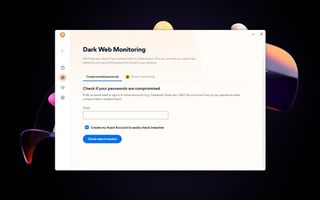
Password Protection
There’s no password manager in Avast One, but you do get a couple of protective layers to keep your credentials private. Notably, all of the platform’s versions offer the option to check if your passwords are compromised in a data breach.
Avast One’s paid products add breach monitoring, where the app automatically checks for new breaches and warns you if your credentials are involved. The paid editions also throw in a Browser Shield, which limits access to passwords stored in your browser.
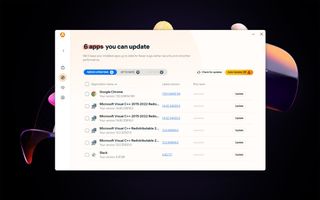
Software Updater
Avast One Basic’s Software Updater scans your apps, detecting and listing any missing updates. It will install them too, although you need to manually click on the Update button for each. Upgrade to Avast One Silver and you get the ability to automatically update them.
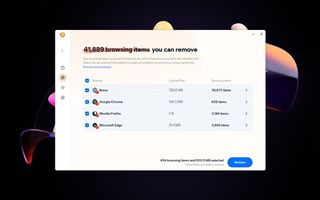
Privacy extras
All Avast One users get access to a Clear Browsing Data feature, where you can quickly get rid of your browsing history, cache, cookies, and more. This works much like any other web cleanup tool, but Avast does deserve credit for its wide app support.
As it happens, it efficiently cleans Chrome, Firefox, Edge, Opera, Brave, and even Thunderbird.
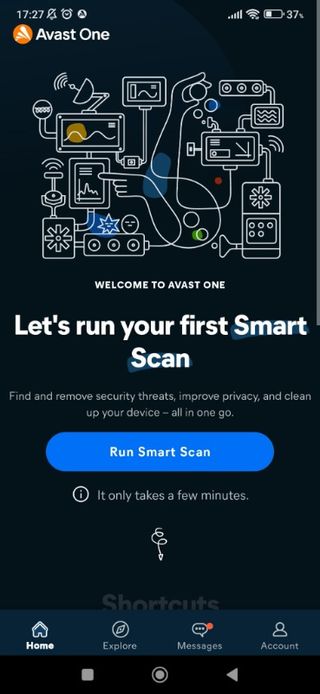
Mobile
In addition to helping protect your PC and Mac, Avast One also lets you cover your Android and iOS devices, with free and paid versions for both. The overall process of installing it on Android involves giving the same layers of permissions for all the security tools to work - as expected.
The antivirus program itself runs smoothly, scans are quick, and the interface is nice, very easy to understand and use.
Verdict
Avast’s Basic program is a stellar free app, with an impressive number of security tools for a free offering, continuously scoring high in both malware detection and zero-day threat blocking.
Avast One Silver
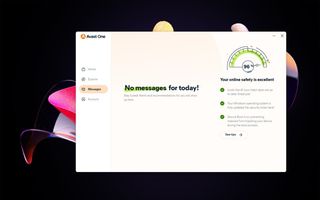
Paying for Avast One Silver gets you a number of additional interesting and unusual features.
It comes with the Sensitive Data Shield that automatically scans your drive for files containing sensitive information - names, addresses, passwords, financial details, and the like - and prevents your device’s other users from accessing them.
Meanwhile, the Web Hijack Guard protects browser traffic from DNS hijacking, a nasty exploit where hackers redirect your traffic to malicious websites.
Avast’s Webcam Protection controls webcam access to reduce the chance of malware accessing your device. By default, this allows trusted apps to access your webcam and blocks everything else until you give permission. However, you can also up the protection level to Strict Mode, which asks for permission whenever anything tries to access the webcam, or you can disable your webcam entirely.
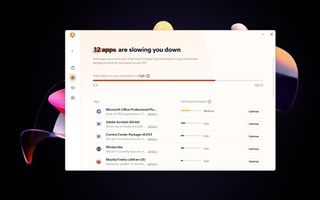
Performance boost
Avast One’s paid versions round off their feature set with a collection of PC maintenance tools, including a PC Speedup that lists apps slowing down your system and allows you to optimize them to speed up your PC.
Then there’s the Driver Updater, which scans your system for missing driver updates, allowing you to download and install them in a couple of clicks. That said, this might be potentially risky as a single mistake could turn your PC unusable, so caution is advised.
Finally, Avast One’s Disk Cleaner does an excellent job of scanning your system for surplus and leftover files, potentially freeing up a significant amount of drive space.
VPN
All of Avast One’s paid subscriptions feature the secure VPN as in its Basic offering. However, at this point, you’re no longer limited to just one location and 5GB of data. With unlimited usage, you can connect and use the Avast VPN whenever and for however long you want to.
Moreover, you’re getting access to any of Avast’s VPN servers in more than 50 locations around the world. This gives you added security as it hides your real location and allows you to generate a new IP address every time you connect.
Verdict
The jump in protection between the free Avast One and paid subscriptions is impressive and well worth the money. In fact, the unlimited VPN access alone is worth the annual cost.
Avast One Gold
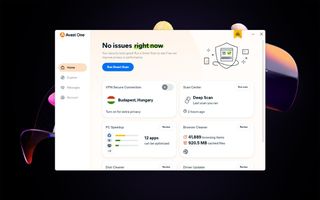
ID monitoring
Avast One Gold takes the password tool from the lower tiers further by introducing ID monitoring. This service checks if your online identity has been compromised and keeps an eye on the dark web for your personal identifying information, like bank accounts, credit card numbers, full names, birthdates, and SSNs.
If any personal info is found, Avast will help you contact the appropriate agencies, change login credentials, and restore your identity.
Verdict
All things considered, Avast One is considered one of the most popular antivirus software in the world, and for many a good reason. It has numerous useful protection tools, bundling them all up into a strong suite where everything works well together.
Even better, many of its advanced security tools come in the free version for home use, making it one of the best free antivirus apps you’ll find. Paid upgrades are available for those who wish to have more extensive protections in place.
- Here are the featured best cloud antivirus or try out other picks on the best free antivirus list before you go premium.
Sead is a seasoned freelance journalist based in Sarajevo, Bosnia and Herzegovina. He writes about IT (cloud, IoT, 5G, VPN) and cybersecurity (ransomware, data breaches, laws and regulations). In his career, spanning more than a decade, he’s written for numerous media outlets, including Al Jazeera Balkans. He’s also held several modules on content writing for Represent Communications.
You must confirm your public display name before commenting
Please logout and then login again, you will then be prompted to enter your display name.
Most Popular




